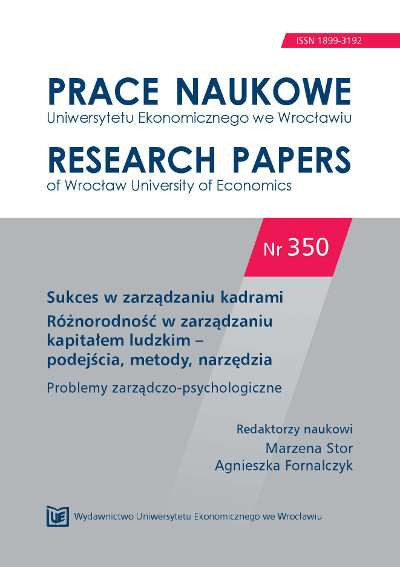Zachowania etosowe w kontekście pracy zawodowej
Ethos behaviours in the context of working life
Author(s): Karolina Ławecka, Paulina Stokłosa, Alicja Keplinger, Emilia FrątczakSubject(s): Economy
Published by: Wydawnictwo Uniwersytetu Ekonomicznego we Wrocławiu
Keywords: ethos behaviour; organizational citizenship behavior; self-control (self-monitoring)
Summary/Abstract: In the context of working life and also basing on literature of the subject, ethos behaviors are defined as the Organizational Citizenship Behavior. These behaviors may manifest in casual situations, such as: 1) helping each other at work and courtesy 2) loyalty and organizational subordination 3) assiduity in activity (which can be comparable to sportsmanship), 4) evincing individual initiative and 5) care about personal development. Using OCB everyday may be a sensitive issue – it is connected with the fact that people often quest for presenting themselves in a better light and also with the pressure of social acceptance. Gerald Blakely and others formulate a provocative question i.e. Can the ”chameleons” be reliable employees or would they rather use OCB only because they want to play to the grandstand? The main object of this article is checking if there is any relationship between the OCB (presented by the employees and their staff) and the type of self-control. The article also discussesthe characteristics of this relationship. The research was conducted in 2014and the research sample was formed by 240 people. About 30% of them work as leaders or directors in some enterprises in Lubusz and Lower Silesian Voivodenships. Their subordinates are the rest of the group. The Questionnaire of Dispositional and contextual determinants of organizational citizenship behavior intended by Mary Konovsky and Dennis Organ was used in the research. The questionnaire was made on our own. We also used a test which measured Observer Control of Expression Ourselves Behaviors and which was intended by Marc Snyder and translated by Bogdan Wojciszke. In Poland this test is named a pragmatism-principlesquestionnaire.
Journal: Prace Naukowe Uniwersytetu Ekonomicznego we Wrocławiu
- Issue Year: 2014
- Issue No: 350
- Page Range: 202-210
- Page Count: 9

